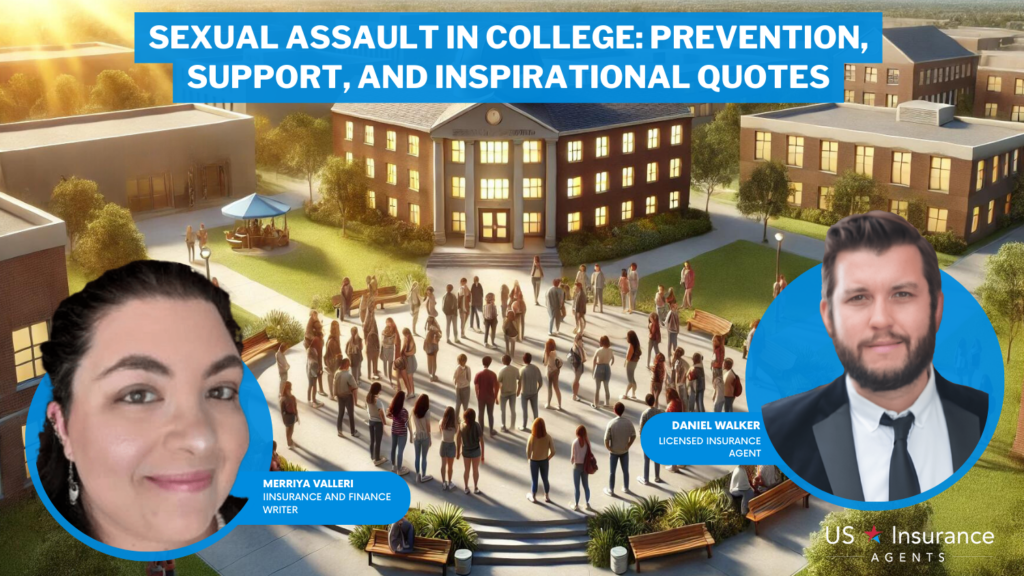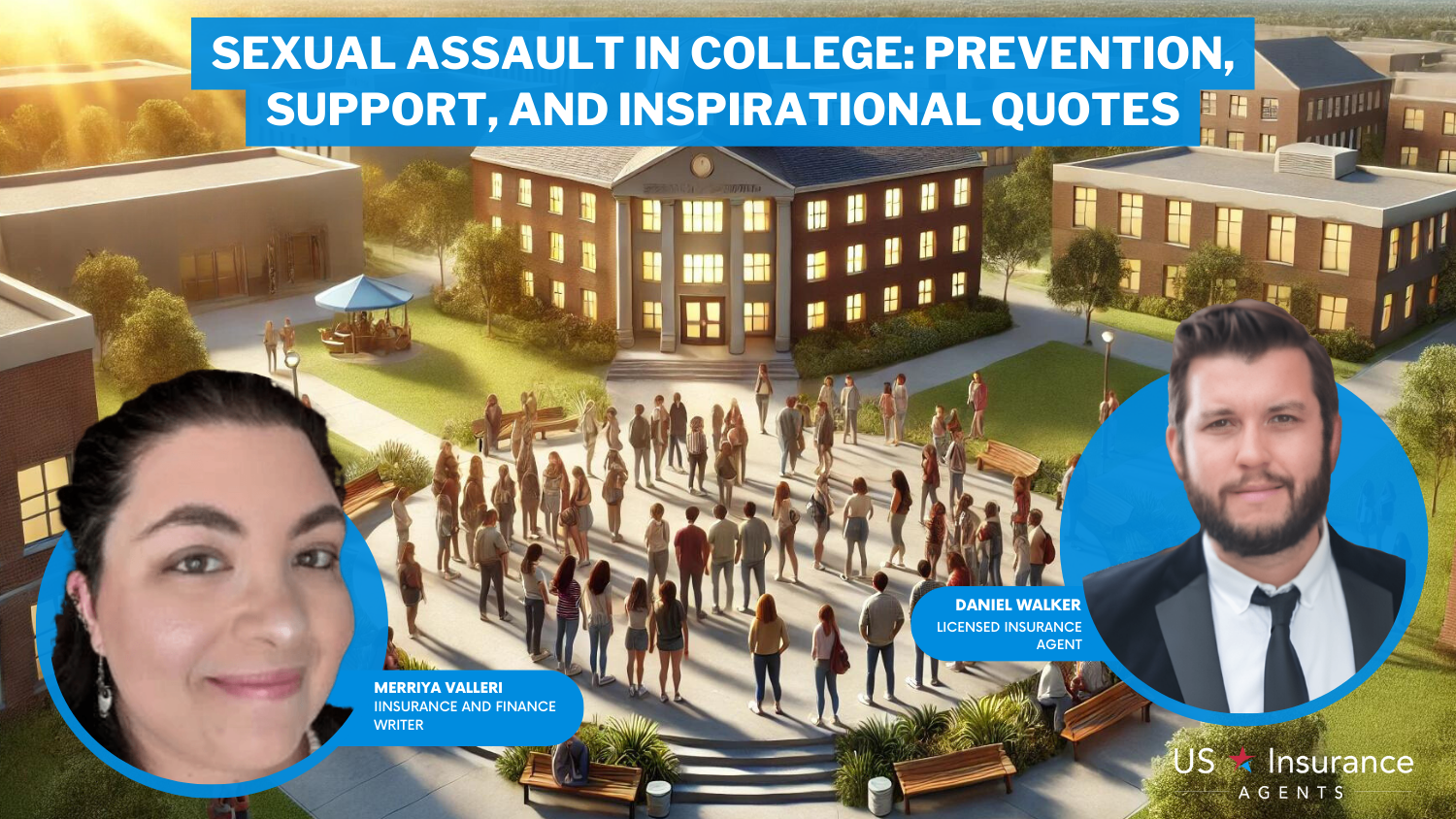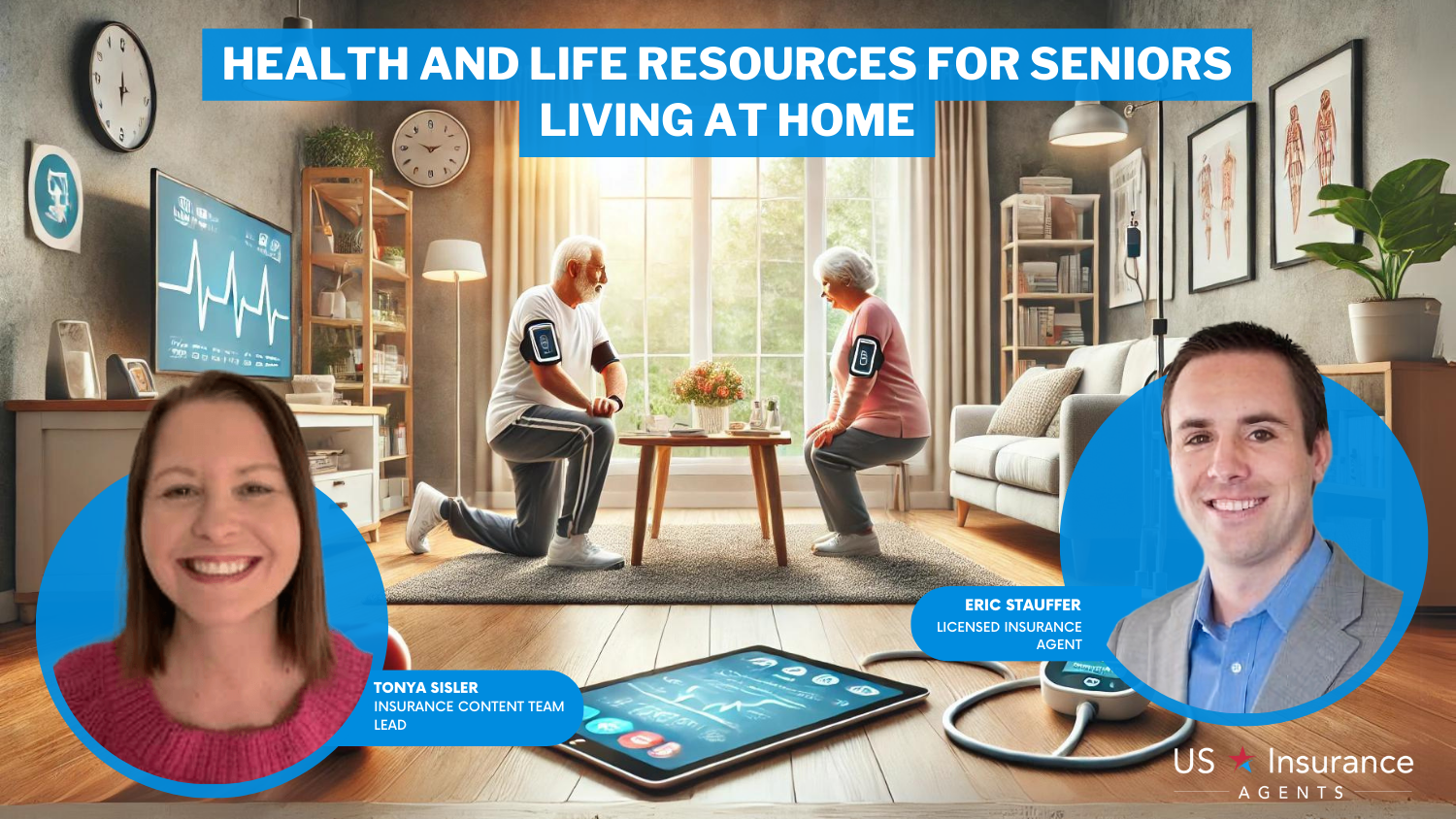Sexual Assault in College: Prevention, Support, and Inspirational Quotes
Uncover proactive approaches to prevent sexual assault in college, access crucial support systems, and ignite resilience with inspiring quotes. Explore a comprehensive resources, offering a deep understanding of sexual assault dynamics, holistic support avenues, and uplifting narratives. Empower yourself with knowledge, compassion, and the tools to create a safer campus environment.
Read more Secured with SHA-256 Encryption





Table of Contents
Table of Contents


Insurance and Finance Writer
Merriya Valleri is a skilled insurance writer with over a decade of professional writing experience. Merriya has a strong desire to make understanding insurance an easy task while providing readers with accurate and up-to-date information. Merriya has written articles focusing on health, life, and auto insurance. She enjoys working in the insurance field, and is constantly learning in order to ...
Merriya Valleri


Sr. Director of Content
Sara Routhier, Senior Director of Content, has professional experience as an educator, SEO specialist, and content marketer. She has over 10 years of experience in the insurance industry. As a researcher, data nerd, writer, and editor, she strives to curate educational, enlightening articles that provide you with the must-know facts and best-kept secrets within the overwhelming world of insurance....
Sara Routhier


Licensed Insurance Agent
Dan Walker graduated with a BS in Administrative Management in 2005 and has been working in his family’s insurance agency, FCI Agency, for 15 years (BBB A+). He is licensed as an agent to write property and casualty insurance, including home, life, auto, umbrella, and dwelling fire insurance. He’s also been featured on sites like Reviews.com and Safeco. He reviews content, ensuring tha...
Daniel Walker
Updated October 2024
Welcome to our comprehensive guide on Sexual Assault in College: Prevention, Support, and Inspirational Quotes. We understand the importance of addressing this pressing issue that affects many college students.

In this article, we aim to provide valuable insights into various aspects of sexual assault, including prevention strategies, support systems, and the profound impact of inspirational quotes in fostering resilience.
We also emphasize the significance of creating safe and supportive environments for survivors, highlighting available resources such as counseling services, helplines, and campus support groups. Furthermore, we explore the power of inspirational quotes in healing, self-empowerment, and raising awareness about sexual assault. These quotes offer solace, encouragement, and a sense of solidarity to those affected.
College Assault Statistics
College assault statistics are required, by law, to be shared with the community at any public college or university. However, these statistics are not always easy to find on websites and may become buried in the many messages being sent out by colleges. Title IX, signed into law in 1972, states that no person in the United States shall be excluded on the basis of sex from any public institution receiving federal funding, and thus, if sexual assault happens at a federally funded institution, it has to be reported.
Approximately 19% of women will be sexually assaulted, compared with approximately 6% of men. These statistics show that we should never discount the experiences of male assault survivors and should recognize that the low number may also result from an unwillingness to report sexual assault. The numbers also highlight the fact that women are disproportionately impacted when it comes to being the victims of sexual assault.
Resources:
- Know Your IX: Statistics
- National Sexual Violence Resource Center: Statistics about sexual violence
- One in Four USA: Sexual assault statistics
- The Center for Public Integrity: A lack of consequences for sexual assault
Free Life Insurance Comparison
Compare Quotes From Top Companies and Save
Secured with SHA-256 Encryption
Types of Sexual Assault and Abuse
Sexual assault and abuse can take many forms on a college campus. Anything from unwanted comments to intimidation can be abuse. Even things that are meant as jokes can be abusive depending on the context and the expectation. Sexual assault is generally physical, and can include unwanted touching, forcing, or coercing someone to perform sexual acts against their will or while intoxicated. One thing is important to remember. No matter what type of sexual abuse or assault – it is NEVER the victim’s fault.
Resources:
- RAINN: Sexual assault
- End Rape on Campus: Title IX
- National Institute of Justice: Sexual assault on campus
Prevention Tips
Victims should not bear the sole burden of preventing rape, assault, or abuse. We should live in a culture that does not encourage the behavior in the first place.
Unfortunately, even today, when it comes to the topic of sexual assault on women, many people will say that women should not drink too much or wear provocative clothing.
However, that is putting an unrealistic burden on the woman for a crime being committed against her, and is diminishing the responsibility of the perpetrator, the person who is actually committing the crime.
It is a good idea to always look out for your friends and, until the culture changes, to take steps to stay safe. Have a friend help you to stay safe and do the same for them.
Do not be afraid to speak up or say no if something feels wrong, and never assume that only strangers rape and assault.
In fact, most sexual assaults in college come from acquaintances. You should also be aware of the crime statistics on your campus and know your rights as well as the types of sexual abuse and assault.
Resources:
- Our Bodies, Ourselves: Preventing sexual assault on college campuses: what works?
- Culture of Respect: Sexual assault prevention programs
Steps to Take After Assault
If you are raped or assaulted, the first step to take is to reach out and tell someone. This is not something to be ashamed about. It is NOT your fault, and the person who did it to you deserves to be exposed. Seek medical attention as soon as you can if you were physically assaulted in any way, and always make sure that you get a complete physical during your examination. Bruises, cuts, abrasions, or marks may be important in creating a case later. Also, although there may be immense pressure not to, it is best to press charges immediately. Even if you change your mind, initially pressing charges will make for a stronger case. Finally, tell someone in authority. If they deny what happened or try to convince you not to tell, go to someone else, and keep going until you succeed.
Resources:
- Women’s Health: Sexual assault
- Jane Doe Inc.: Immediate steps after sexual assault
- Joyful Heart Foundation: Effects of sexual assault
- Maryland Coalition Against Sexual Assault: What to do after sexual assault
Free Life Insurance Comparison
Compare Quotes From Top Companies and Save
Secured with SHA-256 Encryption
Healing After an Assault
Rape and assault cases, especially in college, can drag out. You may not get closure and you may have to see the perpetrator around campus. You may want to attend counseling, but even if you do not choose to go that route, you should definitely have a group of people or a few close friends you can talk to. The most important thing is to realize that assault and abuse are the fault of the person who committed the crime. Do not second guess yourself or feel as if you are to blame as a victim.
Resources:
- Psychology Today: Overcoming sexual assault: symptoms and recovery
- College of Saint Benedict/Saint John’s University: Sexual assault survivor’s guide
- American Psychological Association: Sexual abuse
Inspirational Quotes
“H.O.P.E. – Hold on Pain Ends” – Unknown
“Healing doesn’t mean the damage never existed. It means the damage no longer controls our lives.” – Akshay Dubey
“I never knew how strong I was until I forgave someone who wasn’t sorry and accepted an apology that I never received.” – Unknown
There are hundreds of quotes that can inspire you to heal after being assaulted, but maybe the most important is something that speaks to you, doesn’t assign blame to you, and helps YOU heal. Anything can be inspirational, so pick something that speaks to you and helps you heal but also helps you stay focused on change and the fight you are facing. Find helpful friends and things that resonate with you.
Resources:
- It’s on Us: Tools
- No More: Supporting survivors
Try to solve the new Formula Cube! It works exactly like a Rubik’s Cube but it is only $2, from China. Learn to solve it with the tutorial on rubiksplace.com or use the solver to calculate the solution in a few steps.

Frequently Asked Questions
What is sexual assault, and how prevalent is it on college campuses?
Sexual assault is any unwanted sexual contact or behavior that happens without the victim’s consent. It can include a range of behaviors such as groping, non-consensual sexual touching, and rape. Sexual assault is unfortunately prevalent on college campuses. According to the National Sexual Violence Resource Center, one in five women and one in 16 men are sexually assaulted while in college.
What resources are available on college campuses for survivors of sexual assault?
Here are the six resources that are commonly available on college campuses for survivors of sexual assault:
- Confidential counseling services: Most colleges and universities have counseling services that are available to students free of charge. These services are often staffed by trained professionals who can provide support and guidance to survivors of sexual assault.
- Sexual assault response teams: Many colleges have specialized teams of professionals who are trained to respond to reports of sexual assault. These teams may include campus security officers, counselors, and medical personnel.
- Medical services: Survivors of sexual assault may require medical attention, such as emergency contraception, STD testing, or treatment for injuries. Most college health centers are equipped to provide these services and can refer survivors to other medical providers if necessary.
- Advocacy organizations: Many college campuses have student-run advocacy organizations that provide support and resources to survivors of sexual assault. These groups may offer peer counseling, education and outreach programs, or other forms of support.
- Legal services: Survivors of sexual assault may need legal assistance to pursue justice or protect themselves from their abuser. Some colleges offer legal services to students free of charge, while others can refer students to local legal aid organizations.
- Title IX coordinators: Title IX is a federal law that prohibits discrimination on the basis of sex in education programs or activities that receive federal funding. Each college and university is required to have a designated Title IX coordinator who is responsible for ensuring compliance with the law. Survivors of sexual assault can contact their school’s Title IX coordinator to report an incident and receive support.
It’s important to note that the availability and quality of these resources can vary from campus to campus. Survivors of sexual assault should research the resources available at their own school and seek out the support they need.
How can we create a culture that supports survivors and works to prevent sexual assault?
Here are seven ways we can create a culture that supports survivors and works to prevent sexual assault:
- Education and awareness: Increasing education and awareness about sexual assault and its impact can help to create a culture of accountability and prevention. This can include education programs for college students, staff, and faculty, as well as public awareness campaigns that promote healthy relationships and consent.
- Bystander intervention: Encouraging and empowering bystanders to intervene when they see potential sexual assault can be an effective way to prevent it from happening. This can include bystander training programs, as well as messaging campaigns that encourage people to be active bystanders.
- Clear policies and procedures: Colleges and universities should have clear policies and procedures in place to address sexual assault and support survivors. This can include a clear reporting process, disciplinary procedures for perpetrators, and support services for survivors.
- Support for survivors: Providing comprehensive support services to survivors of sexual assault can help them heal and recover. This can include counseling services, medical care, legal assistance, and advocacy organizations.
- Empowering survivors: Empowering survivors of sexual assault to speak out and share their stories can help to create a culture that supports survivors and holds perpetrators accountable. This can include providing platforms for survivors to share their stories, as well as support and resources for those who choose to come forward.
- Holding perpetrators accountable: Holding perpetrators of sexual assault accountable for their actions is crucial in creating a culture that supports survivors and prevents future sexual assault. This can include disciplinary action by colleges and universities, as well as criminal prosecution by law enforcement.
- Challenging toxic masculinity: Challenging toxic masculinity and promoting healthy attitudes towards sex and relationships can help prevent sexual assault. This can include promoting healthy communication and respect in relationships, challenging harmful gender stereotypes, and promoting positive role models for young men.
It’s important to note that creating a culture that supports survivors and works to prevent sexual assault is an ongoing process that requires commitment and action from all members of society.
What are some warning signs that someone may be a potential perpetrator of sexual assault?
Here are the seven most common warning signs that may indicate someone is a potential perpetrator of sexual assault but it’s important to note that not all individuals who display these behaviors are perpetrators of sexual assault, and not all perpetrators display these behaviors.
- Refusing to respect boundaries: A potential perpetrator of sexual assault may refuse to respect others’ boundaries, such as continuing to engage in sexual behavior even after their partner has expressed discomfort or said no.
- Using coercion or manipulation: Perpetrators of sexual assault may use coercion or manipulation to pressure someone into engaging in sexual behavior, such as threatening to harm them or someone they care about if they do not comply.
- Ignoring consent: A potential perpetrator may ignore the concept of consent altogether, believing that they are entitled to engage in sexual behavior with someone regardless of their partner’s desires or boundaries.
- Blaming others: Perpetrators of sexual assault may blame their victims for their own behavior, such as claiming that the victim “asked for it” or “wanted it.”
- Engaging in sexually aggressive behavior: A potential perpetrator may engage in sexually aggressive behavior, such as groping, grabbing, or other unwanted physical contact.
- Disrespecting others’ privacy: A potential perpetrator may engage in behavior that disrespects others’ privacy, such as peeping or secretly filming sexual encounters without consent.
- Engaging in problematic or abusive behavior in other areas of life: Perpetrators of sexual assault may engage in other forms of problematic or abusive behavior, such as verbal or physical abuse.
It’s important to note that these warning signs are not always indicative of a potential perpetrator of sexual assault, but they may be cause for concern and should be taken seriously.
What inspirational quotes can help survivors of sexual assault and their loved ones feel empowered and supported?
Here are ten inspirational quotes that can help survivors of sexual assault and their loved ones feel empowered and supported:
- “The human spirit is stronger than anything that can happen to it.” – C.C. Scott
- “You are not alone. You are not to blame. You will heal.” – Rachel Thompson
- “The only way out of the pain is through it.” – Rachel Naomi Remen
- “It is not what happens to you that defines you, it’s how you choose to respond that counts.” – Nick Vujicic
- “You may encounter many defeats, but you must not be defeated.” – Maya Angelou
- “The only way to deal with fear is to face it head-on.” – James Patterson
- “Your story is important, and it matters.” – Leslie Morgan Steiner
- “You have the power to say, ‘This is not how my story ends.’” – Christine Mason Miller
- “You are stronger than you think, braver than you know, and loved more than you can imagine.” – Unknown
- “Healing may not be easy, but it is possible.” – Unknown
These quotes can help remind survivors of sexual assault and their loved ones that they are not alone and that healing is possible. It’s important to note that healing is a process, and that everyone’s journey is different.
Get a FREE Quote in Minutes
Insurance rates change constantly — we help you stay ahead by making it easy to compare top options and save.







